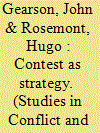|
|
|
Sort Order |
|
|
|
Items / Page
|
|
|
|
|
|
|
| Srl | Item |
| 1 |
ID:
142097


|
|
|
|
|
| Summary/Abstract |
The appropriateness of the United Kingdom's counterterrorism strategy, known as CONTEST, divides opinion. This article reassesses CONTEST as strategy rather than simply examining its effectiveness as policy, or critiquing its individual parts. Reviewing the development of CONTEST in the context of wider analytical discussions on what makes for good strategy, the authors argue that several important strands of CONTEST are either underdeveloped or not yet as “strategic” as some analysts and the U.K. government itself have professed them to be. Fresh thinking on aspects of counterterrorism is urgently needed to counter the challenge of contemporary and future terrorism.
|
|
|
|
|
|
|
|
|
|
|
|
|
|
|
|
| 2 |
ID:
112455


|
|
|
|
|
| Publication |
2012.
|
| Summary/Abstract |
This article considers the developing role of deterrence in countering conventional terrorist threats, tracing the post-9/11 rejection and later rediscovery of deterrence as a tool of counter-terrorism. Why do so many policymakers assume that the 'new' terrorism represented such a break with the past? Why was deterrence neglected as a consequence, under the belief that few terrorists do not aspire to be strategic in their campaigns? To the contrary, this analysis shows that most terrorists are open to attempts at coercion and in particular can be influenced by denial-based strategies. In the case of the United Kingdom, denial-based strategies successfully diverted a potentially crippling campaign of economic dislocation in the 1990s, with lessons for today's challenges. A reinvigorated focus on resilience - physical and societal - as part of a denial-based approach to deterring terrorist attacks, particularly those involving home-grown activists, is recommended. This offers the prospect of time and space for broader counter-terrorism programmes of counterradicalization and de-legitimization to run their course and should be part of future counter-terrorism strategies.
|
|
|
|
|
|
|
|
|
|
|
|
|
|
|
|
| 3 |
ID:
153058


|
|
|
|
|
| Summary/Abstract |
The British Military Covenant can be located in and from many sources and from 2011 onwards in primary legislation. This article argues that the provision of military housing amounts to an early test of how the military covenant is understood and used by those involved in defence policy, and those in the armed forces affected by it. It finds that housing was a prominent feature of how service personnel understood how they were valued, but was not explicitly understood as a covenant issue by those personnel or the officials in charge of the Defence Estates. We locate three reasons for this: (1) the covenant has been poorly translated from aspiration into policy practice, (2) the covenant is unevenly understood across its stakeholders which has the effect of generating disappointment through misaligned expectations, (3) those engaged in the reform process surrounding the Defence Infrastructure Organisation (DIO) saw the covenant as a means to energise reform. Ultimately housing was seen as a dry and technocratic business area and thus an issue ripe for being refracted through the covenant was ultimately left outside of its remit.
|
|
|
|
|
|
|
|
|
|
|
|
|
|
|
|
| 4 |
ID:
099099


|
|
|
|
|
| Publication |
2010.
|
| Summary/Abstract |
The Conservative-Liberal Democrat coalition government has committed itself to a Strategic Defence and Security Review (SDR) in 2010. The government and the country face very hard choices to bring United Kingdom defence and security policy back from the brink of bankruptcy-both financial and strategic (Gow). To succeed, it must overcome the failings of the past (Chisnall, Dorman, Rees) and take a truly open and radical look at all aspects of policy and process-including the Trident independent nuclear deterrent (Allen), relations with Europe (Witney) and the importance of cyber-issues in the future security context (Fisher). It must get strategic concepts right to provide flexibility with credibility (Stone). It must deliver 'what the military wants': true strategic prioritisation, radical defence acquisition reform, and credible balancing of resources and commitments (Kiszley). The scale of the challenge facing the United Kingdom in-and beyond-the 2010 SDR is why The Political Quarterly convened a workshop early in 2010 involving MPs, practitioners, retired military personnel, journalists, commentators, business people and academics, and publishes these associated papers. Most of all, to overcome the failings of the past, there must be a radical move beyond the welcome first steps of the Cameron-Clegg government to introduce a National Security Council and a National Security Advisor, to reconfigure relationships within government, across departments and with Parliament to have a government figure of accountability and responsibility-a Secretary of State for Security Policy, primus inter pares with other Secretaries of State-to make sense of the questions needing to be asked and answered (Gearson and Gow).
|
|
|
|
|
|
|
|
|
|
|
|
|
|
|
|
|
|
|
|
|